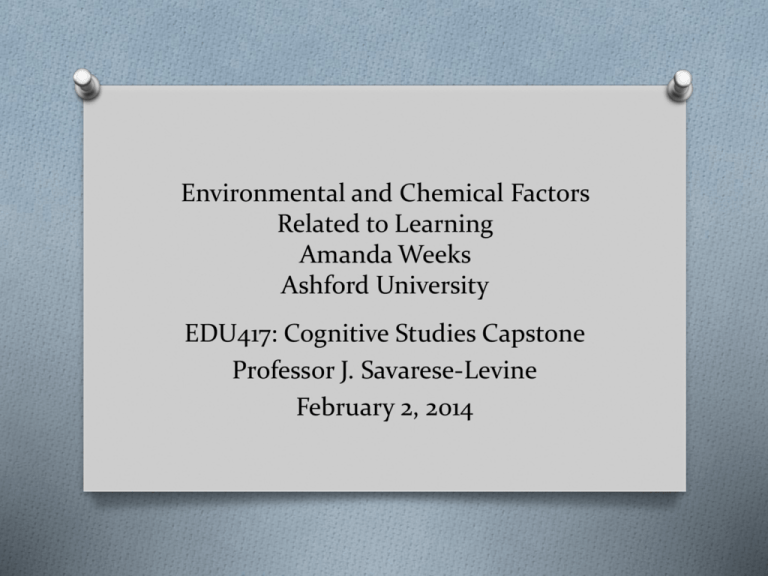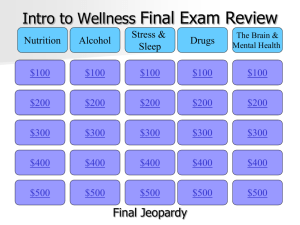File - Amanda's Cognitive Studies Blog
advertisement

Environmental and Chemical Factors Related to Learning Amanda Weeks Ashford University EDU417: Cognitive Studies Capstone Professor J. Savarese-Levine February 2, 2014 What Affects Your Child’s Brain? It important to have a basic understanding of the chemical factors (i.e., Environmental factors also have a major impact, including: O Sleep neurotransmitters) that O Exercise affect your child’s ability to O Nutrition learn. O Technology Some Common Neurotransmitters Dopamine Multiple functions depending on where in the brain it acts; vital to movement and thought and regulating emotional responses. Serotonin Helps regulate temperature, sensory perception, mood, and sleep. Acetylcholine May aid in regulating memory; controls actions of skeletal and smooth muscle. Sleep, Exercise, Nutrition, and Technology: Effects on Learning and Memory Why Your Child Needs a Good Night’s Sleep O At certain times during the sleep cycle, the brain is as active as when we are awake and problemsolving. O During sleep, consolidation occurs, which is “the process of stabilizing a memory trace over time, moving it from short-term to long-term memory” (Wolfe, 2010, p. 96). O While we sleep, we process information we learned during the day, which contributes strongly to memory formation. The Importance of Nutrition to Learning O Complex carbs improve attention, working O O O O memory, and episodic secondary memory. Obese adults have been shown to have 8% less brain tissue. High levels of saturated fats impair memory and learning. Omega-3 fatty acids are vital to hormone balance and immune system, which are essential to a healthy brain. Neurotransmitters are composed of amino acids, which we gain from our diet. How Exercise Impacts Learning O Physical activity increases oxygen flow to the bloodstream, which increases growth and plasticity of frontal lobes. O Exercise can induce neurogenesis (growth of new neurons). O Movement causes the release of proteins that trigger the release of BDNF (brain-derived neurotropic factor), which stimulates neural growth and learning. Technology and Learning: Both Risks and Benefits of Video Games and TV are Highly Debatable O The effects of TV shows and video games depend on the content, age of the child, and time spent viewing/playing. O If they replace valuable activities such as exercise and studying, the impact is quite negative. O Shows with complex plots can enhance higher level thinking skills. O Well-designed educational video games can focus on critical skills and provide practice, feedback, and motivation. O Games that allow players to work together enhance social skills. References O Fischer , K. W., Immordino-Yang, M. H., & , (2008). The Jossey-Bass reader on the brain and learning. (1st ed.). San Francisco, CA: Jossey-Bass. O Ganzer, C., & Zauderer, C. (2011). Promoting a brainhealthy lifestyle. Nursing Older People, 23(7), 24-27. Retrieved from Ashford Library. O Weis, T., Puschmann, S., Brechmann, A., & Thiel, C. M. (2012). Effects of L-dopa during Auditory Instrumental Learning in Humans. Plus ONE, 7(12), 111. doi:10.1371/journal.pone.0052504. Retrieved from Ashford Library. O Wolfe, P. (2010). Brain matters: Translating research into classroom practice. (2nd ed.). Alexandria,VA: Association for Supervision & Curriculum Development.






